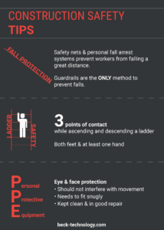How to Be an Ally for Women in Construction
10.8%. That’s the percentage of women in the U.S. construction industry in 2023 according to the Bureau of Labor Statistics. We are celebrating the 26th annual Women in Construction Week this week (March 3-9) by diving into being an ally for women in construction.
What is an ally and why should I be one?
Being an ally means being an advocate for others with less privilege than you to help promote their voices and experiences. You can leverage your power and influence to assist someone else in overcoming hurdles. Some of those hurdles are lack of on-the-job training, limited promotion opportunities, earning respect from leadership and peers, flexibility for expecting mothers, and many other challenges.
Being an ally for women in construction means creating a more diverse business that encourages input and ideas from every angle of the company. Additionally, recent U.S. census data pointed out that 50.4% of the population is female. The construction industry is missing out on a lot of talented people and being an ally for women leads to more employment of women.
Who can be an ally for women in construction?
Anyone who has influence can be an ally for others. In construction, it includes company leadership, managers, mentors, men, women, senior team members … if you haven’t caught on yet, anyone can be an ally. Allies recognize their leverage and privilege then use it to uplift others.
Let’s explore four steps to becoming an ally for women in construction.
4 Actions of Allies
1. Educate YourselfTo be an ally for women, you must first get educated on their experiences. Understanding their challenges and hurdles is paramount so you know how to open doors and have meaningful conversations that lead to lasting change.
Being an ally is not a passive, one-time activity. It requires being engaged, learning, and listening. Various construction organizations host women-focused education sessions. NAWIC’s Women in Construction Week website has several educational resources available. However, those sessions do not mean they are only for women to attend. They are meant to talk about experiences women have faced in the construction industry and opportunities to limit challenges in the future. Join the sessions and be part of the discussion.
2. Accept CriticismTo listen to our panel discussion on women in construction, click here.
Everyone makes mistakes. Be open to feedback about your missteps and be willing to take corrective actions. This may be a hard action to do because it points out that you are not perfect. However, it can clearly show the women you want to be an ally for that you can learn and do better.
“Active listening is an acquired skill, but one that will pay dividends if we practice it,” says Allison Lewis, Learning and Development Lead at Beck Technology. “If you are interrupting people to get your point across, then that indicates to the other person that you don’t care what they have to say. Be present and let the other person know that you are really listening to what he/she has to say by staying focused on him/her and not thinking about what you are going to say next to defend your position.”
Julie Huval, Head of Marketing at Beck Technology, provided this feedback, “While publicly praising female co-workers is a good thing to do you should also look at what tasks you are asking them to do in comparison to their male counterparts. For example, always asking a woman to take meeting notes limits their ability to be part of the conversation in the moment. Either find a tech tool that can take the meeting notes or round robin the ask to everyone in the meeting.”
“Providing one-on-one feedback after a meeting is more effective than giving feedback during a meeting in front of others,” shares Summer Brittain, Head of Services at Beck Technology. “This approach allows for a more personal and constructive discussion, fostering a trusting relationship and ensuring feedback is received positively. Giving feedback in a group setting can be embarrassing and less impactful. Timing and privacy are key for feedback to be meaningful and lead to improvement.”
Kristin Vrana, Customer Content Manager at Beck Technology had this advice to share, “Make sure review criteria is consistent between female and male employees. Women tend to get harsher feedback based on their personalities than men do. And female personalities tend to come up in reviews more frequently than male personalities. ‘Past research has shown that women are more likely to receive inflated feedback, and less likely to receive actionable feedback, than men are.’ The word emotional is more frequently used to describe women. But a man's anger is not typically considered emotional.”
The road to becoming an ally is not easy. But it is worth it! Being a true ally requires conversation and mentoring from both sides. Receiving advice from the people you want to see succeed in construction is a great step forward to cementing your allyship desire.
3. Recognize Privilege
The National Association of School Psychologists states “Privilege exists when one group has something of value that is denied to others simply because of group membership and not based on what a person or group has done or failed to do.”
Being aware of your privilege starts to peel back the layers of how underrepresented groups like women have not been exposed to the same opportunities. Taking stock of how a dominant group has benefited from access not easily available to others is a step in the right direction for accelerating allyship.
4. Amplify Voices
This is where you get to use your position to promote and advocate for women in construction. Invite female team members to participate in important customer meetings, have them join a leadership committee, mentor them so they can learn from your experiences and leadership style, and allow them to be change makers in your business.
You can also represent the women in the industry by advocating for company policies, site requirements, schedule flexibility, and additional opportunities that not only support women but lead to a better work environment for everyone.
The construction industry is a great career option for everyone who is willing to put in the work to build better communities and infrastructure. Together, we can ensure the future of the industry is diverse, forward-thinking, and abundant with allies for every person.

-1.png?width=112&height=112&name=image%20(4)-1.png)
















